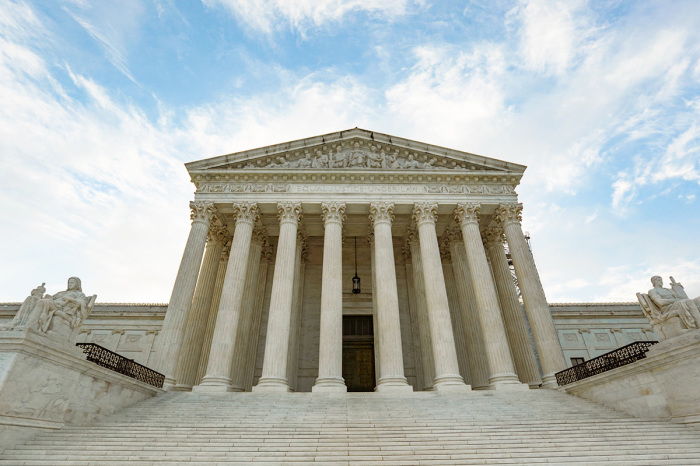Supreme Court hears case of Rastafarian forced to shave dreadlocks
 The U.S. Supreme Court in Washington, D.C., in September 2024. | Getty Images
The U.S. Supreme Court in Washington, D.C., in September 2024. | Getty ImagesThe U.S. Supreme Court heard arguments Monday for a case involving whether Louisiana prison officials must pay damages to a former inmate who had his hair forcibly shaved in violation of his religious beliefs.
The case centers on Damon Landor, a Rastafarian who was handcuffed to a chair and forcibly shaved at the Raymond Laborde Correctional Center, ignoring his religious objections.
The question before the high court is whether Landor can demand damages from individual government employees under the federal Religious Land Use and Institutionalized Persons Act.
During the oral arguments, Zachary Tripp, an attorney for Landor, argued that if damages cannot be awarded under RLUIPA, then “officials can literally treat the law like garbage.”
“It expressly authorizes suit against an official or any other person acting under color of state law,” Tripp said. “That obviously means individual capacity. And then, once you see there’s an individual capacity action, the rest of it falls into line.”
“This court has already held … that officers in a federally funded state prison can be held individually liable for misconduct that threatens the integrity or proper operation of the program, and that describes this case to a T.”
Tripp also argued that the defendants “voluntarily accepted” a job that would hold them to federal standards like RLUIPA, and that “individual capacity damages are the norm for them.”
Libby Baird, assistant to the Solicitor General of the U.S. Department of Justice, supported Landor, telling the justices that “RLUIPA clearly authorizes individual capacity damages suits against state officials.”
“RLUIPA’s language puts states on clear notice that state officials can be sued for damages in their individual capacity,” she said. “And under the spending and ‘necessary and proper’ clauses, Congress can create personal liability for state officials acting as agents of the state when they violate conditions on federal funding.”
Jorge Benjamin Aguiñaga, an attorney for the defendants, argued that “RLUIPA does not clearly and unambiguously create an individual capacity cause of action for damages” and that, if even if they had done so, “Congress exceeded its constitutional authority” by doing it.
“It is extraordinarily important that the court reject petitioner’s attempt to radically expand congressional power,” he continued, noting that while there might be “valid” concerns over the lack of such protections, the “solution” to fix the problem lies with Congress, not the Supreme Court.
Additionally, during arguments, Aguiñaga said that Landor had the option of pursuing a complaint for individual damages through a state version of RLUIPA and clarified that the warden involved in the incident was no longer employed at the prison.
Landor had taken a religious vow not to cut his hair, having refused to do so for nearly 20 years before he was incarcerated in 2020 for less than a year. Known as the Nazirite vow, it is derived from Numbers 6:5.
The first two facilities where he was kept — St. Tammany Parish Detention Center and LaSalle Correctional Center — allowed for him to keep his dreadlocks for religious reasons.
However, according to court documents, when Landor was transferred to Laborde, the intake guard threw his accommodation documents in the trash and had him forcibly shaved.
Following his release, Landor filed a complaint against the Louisiana Department of Corrections, the prison and others, claiming among other things that officials violated his rights under the RLUIPA, as well as the U.S. Constitution.
In September 2023, a three-judge panel of the 5th U.S. Circuit Court of Appeals ruled against Landor, with Circuit Judge Edith Brown Clement, a George H.W. Bush appointee, authoring the unanimous opinion.
Clement noted that while the judges “emphatically condemn the treatment that Landor endured,” the former inmate “cannot seek money damages from officials in their individual capacities” under RLUIPA.
“RLUIPA does not permit suits against officers in their individual capacities, which, in turn, means claimants cannot recover monetary damages,” she wrote.
After a request to have the entire 5th Circuit hear his case was rejected in February 2024, Landor appealed to the Supreme Court, which, in June, agreed to hear oral arguments.
In June 2024, the National Association of Evangelicals and the Christian Legal Society joined an amicus brief with other religious organizations in support of Landor.
“To hold that damages suits against officials in their individual capacity are unavailable under RLUIPA conflicts with this Court’s decisions, in particular with Tanzin v. Tanvir,” read the brief.
“Every step in Tanzin’s reasoning that [the Religious Freedom Restoration Act] authorizes individual-capacity damages suits means, likewise, that RLUIPA authorizes such suits.”
Follow Michael Gryboski on Twitter or Facebook